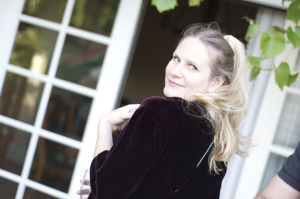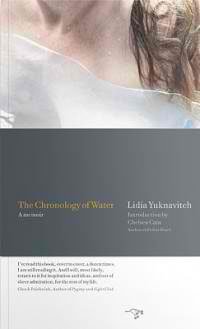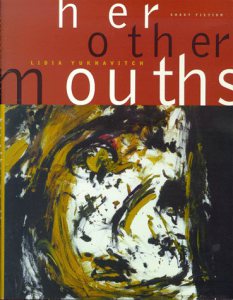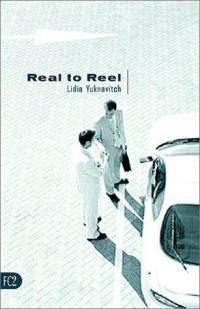Lidia Yuknavitch is the author of three works of short fiction: Her Other Mouths, Liberty’s Excess, and Real to Reel, as well as a book of literary criticism, Allegories of Violence. She is also the author of a memoir, The Chronology of Water. Her work has appeared in Ms., The Iowa Review, Fiction International, Zyzzyva, and elsewhere. Her book Real to Reel was a finalist for the Oregon Book award and she is the recipient of awards and fellowships from Poets and Writers and Literary Arts, Inc. She teaches writing, literature, film, and women’s studies in Oregon. More at http://www.lidiayuknavitch.net/ .
***
UFR: This question is a little broad, but I’d be so interested to hear your answer. Even just from page 1 of The Chronology of Water, it’s clear that you’ve been through a lot; you’re life has been challenging. Yet you have a lot of love. So how did that happen? How did you find love for your grief?
Yuknavitch: There is no map for grief. But there are bridges back to the world, if a person can find the reasons to “come back” from something painful. Believe me when I say I can understand the pull to leave. I do not judge people who can’t find their way back. I nearly didn’t.
But when I was the most alone and lost (like approaching psychosis lost), I could still hear music even when I could not hear the people talking to me. I could still feel things standing in front of a painting or the ocean or trees. I was not able to read long prose works but I could read poems, and oddly, they made such concrete emotional sense to me they lost their special status as creations made from abstract language. Poems went straight in. Paintings. Music. Like a special language for crazy with grief people.
There was somewhere I could “put” my pain and craziness, a place where others had been, a room where mercifully, I was not alone.
That’s where I also found love. It’s the love of damaged people, of artists and misfits and those willing to take the journeys for the rest of us so that we can all live.
But it took me quite a bit longer to come back to people. And when I did, I made some hum-dinger self destructive choices. Because out in the world, it still hurt too much to love. So while I was running around trying to destroy myself in life, a contrary energy came out, and that was writing — drawing — painting — art. I had no idea where it came from at the time. On the page, all kinds of crazy emotions came out of me… rage, pain, pleasure, death, and finally, right there in front of me, love. It came out in a story I wrote called “The Chronology of Water,” written in fragments, more than 20 years ago. The love may have looked weird, it may have come out in “pieces,” but it was love. It was what was underneath my whole puny crappy-ass life. It was what I had ready to give my daughter who died. It didn’t die with her like I thought it did.
This is how it is that so many years later, when I was 38 and I met the Mingo and we had Miles, I was ready. Because of Andy and Miles, I can see love everywhere now.
UFR: Was it easy for you to be so open in writing your memoir? Were there times when you were worried about facing judgment from readers or were you always so committed to the notion of full disclosure?
Yuknavitch: Christ. No, it was more like going inside out or doing what snakes do — shedding skins. It hurt like a son-of-a-bitch. Memoir is not for feint of heart. I had nightmares for more than a year, I drank too much, I had gigantoid mood swings, and lots and lots of self loathing episodes. But the writing wasn’t doing any of it to me. The writing was getting it out of me so it didn’t rot and kill me. Do you know what I mean? I know it’s paradoxical, but it’s still true.
Too, I don’t mean to sound like an ass, but a lot of memoirs seem to lean very hard in the direction of audience comfort or market driven literary values in ways that make my skin itch. My favorite memoirs do not, but a lot of bestselling ones do. You have to understand that “full disclosure” is not as possible with agents and big presses as you may think it is. I have friends who were asked to take segments out of their work or tone it down — sexually explicit segments, or segments about suicide or drug use — so working with the editor Rhonda Hughes at Hawthorne Books — an independent press — actually gave me 110% freedom to explore full disclosure in terms of content, and full artistic production in terms of form. You have no idea how rare that is.
For example, when I said to Rhonda, this book has to be in this odd form because it’s the only way to tell this kind of story, and I’m going to “show” readers how to read it in the first three sequences, she trusted me, she trusted the work, and she said OK. I’m still grateful. Probably I always will be.
UFR: Are you able to live as honestly as you write?
Yuknavitch: These are such great questions. Some of the best ever. Is anyone? I mean I feel like sometimes when I write or paint that the writing or painting IS the honesty. You know? Humans aren’t ever able to live as perfectly as we imagine we might. It’s the human condition to be imperfect and rumpled. Most days I walk around thrilled that I didn’t wear two different shoes and I don’t have ketchup on my shirt or pepper in my teeth. Most days I walk around feeling like I’m failing or sucking because my daily life is not yet devoted to making the planet better, easing suffering.
But then I think maybe what I have to “give” is a piece of paper (or electronic signal — ha). If one person reads that piece of paper and feels less crappy, then it’s worth it to me. Because I could have used that. I do use that. To go on.
So I guess you could say I try and fail daily. There is some comfort in that if you recognize it’s all of us. It’s called living a life.
I do sometimes wonder though — does Deepak Chopra feel this too, only he’s better at hiding it because he’s a snappy dresser and has suave teeth and hair?
UFR: Called The Chronology of Water, water is in fact a guiding metaphor throughout the book. It works so well, especially because you have such a connection to swimming and the like. But why did you feel the need to align this metaphor with your life? Would you be able to process all that’s happened to you if you didn’t have this metaphor to work with? In other words, when speaking in metaphors, are there limits?
Yuknavitch: Poets know this secret and they’ll probably be pissed at me for outing them. It’s exactly the opposite. Speaking in metaphors gives you vast territories of imagination and story that were locked up behind them. When I tell writers I work with to try to exhaust a metaphor, they try it for about a page and poop out. What I mean when I say exhaust a metaphor is to surrender. To go to all the places a single metaphor allows you to go. Which to be honest? Could take a lifetime. That’s what I think Whitman did. Faulkner. Dickinson.
I think for me the trick is to “discover” (I hate that term! It sounds so sappola…discover…like in a soft, deep voice hahaha) your core metaphors and work them the rest of your life. Everybody has some. Every body, too. The key is to figure out what they are so you can bring your self and craft to them.
UFR: Going back to the idea of honesty, part of what makes this book so real is your willingness to deal with issues such as sexuality. You’ve been intimate with both men and women, and you’ve practiced S/M, pain play, and more. So how do you define your own sexuality? Have your views on your sexuality changed since you found your true family?
Yuknavitch: My views on sexuality change DAILY. Possibly HOURLY. And they should! For me, sexuality is a giant territory you get to explore for your entire life. All those countries and differences and terrains. I guess something happened to me along the way that truly “opened” me up to the idea that the cultural scripts we are handed about sexuality, you know, the “available sanctioned options” are just stories. And they are inherited stories, and we inherited them from a bunch of bozos who are now dead and buried and have no idea how living and the forms generated from our living have changed.
Sometimes it cracks me up that “marriage” is still around. Yes, I am married. To a heterosexual man. That doesn’t mean the same thing to me as it may to everyone else. And it doesn’t mean I can’t crack up about it sometimes. It’s funny! Here, sign this magical and serious piece of paper so you can participate as a “citizen” of our nation and divide property rights. Here, stand in this house of an old white man in the sky and where a princess gown and finger cuff each other while everyone throws food at you. Run to the car! Good. Now start arguing!
I’m kidding of course. I love the Mingo out of my mind. And if Andy was Andrea you can bet your ass I’d be married. I don’t care what state I had to live in. I’d marry “Andrea” in every state possible.
UFR: You’re also deeply concerned with issues of sex and gender. For you, what’s the difference between being a gendered “lady” and being a woman?
Yuknavitch: For some reason the word “lady” cracks me up. But I think you are asking me what the difference between being gendered and being a woman is. That’s a fascinating question. I teach women’s studies you know, so I ought to have a fancy answer for this, don’t you think? Ha. The fancy answer is, being gendered is cultural and being a woman is at least partly biological.
But I don’t believe that sentence or how it is structured.
One’s “gender” is both a set of assigned codes and behaviors we get from culture AND something of our own making. Being a woman comes from a set of assigned codes and behaviors we get from culture AND from shit we make up as we go. You know? I guess what most interests me is EXPANDING those codes and behaviors until we reach a point where we are all named, where we all count, where we all get to live and love as humans who embrace gender and sexuality, but who are not limited by it. And absolutely I hope to live to see a day when we do not limit people who are not us with our own equations. I mean how colonialist is that? Colonizing bodies. What a load of crap.
UFR: I’m really curious to know if you have any thoughts on religious interpretation or morality. If you do, how do you live either in or out of those kinds of boundaries?
Yuknavitch: I know how bad this is going to sound but you were stressing honesty earlier, right? So here goes. I think organized religion — and I have studied the world’s major religions quite a bit more than the average Joe — read the world’s major sacred texts (in translation) so I’m not entirely speaking out of my ass when I say this — I think organized religion is fine when it is used to help individuals and groups get through life with ethics and love, and sickening and brutal and lethal when it is used for power or violence or bigotry and intolerance.
In my own life I have jettisoned organized religion. I was raised Catholic. I no longer believe the Catholic church has any credibility on the topic of morality. I think the Catholic church should go to its hell, according to the very terms it delineates itself with. Period.
I do though believe in a kind of “new ethicism” that individuals develop in relation to the earth, each other, and harmonious social organization. Oddly, even though it seems like we live in a time of dire strife, it may also be a time of tremendous potential change — a more global and even cosmic understanding of ethics, morality, being, time. I went to a fancy science and religion conference recently and turns out some of the most intellectually gifted folks see the possibility of science and religion merging — once you drop the various “god” guys and shame rules.
UFR: When you were younger your mother attempted suicide, and you were understandably angry with her. But what’s so interesting, I think, is that as you got older you went through some tough times, and seemed to live within feelings of hopelessness, or despondency, or whatever the word might be. I’m not sure there are words for it. In a way you might have been a kind of mirror to your mother. But so you eventually forgave your mother for what she did. Were you able to forgive yourself?
Yuknavitch: Nope. But I am working on it. I’m farther along than I used to be. Does that count?
UFR: Still thinking about forgiveness, how do you find it? As a process, is it similar to love? If so, how?
Yuknavitch: I think you are probably on to something there — I betcha’ it IS similar to love as a process. That gives me a lot of hope, that idea you have, because if it’s true, maybe I can yet get to it…I mean, if it’s true (by the way I also hate the word “true”), say, that forgiveness is a process of shedding skins of shame and guilt until your have reached skin that is ready to grow and form, then I think I have a chance.
I also think there are complex ways of thinking about forgiveness that are worth meditating on — and yes I mean that in an Eastern Philosophy way. Meditating on forgiveness is a form of “opening” oneself up to higher consciousness and hopefully growth.
UFR: It seems that early in your life your relationship with your father was terse. Your early notions of manhood were negative. But you eventually met the husband you have today, an amazing man. Has this allowed your concept of what a man is to become that of a lifegiver and a lover, rather than a destroyer?
Yuknavitch: YES. Though aren’t we all lifegivers and destroyers? I mean aren’t we all walking meat sacks of creation and destruction, pretty much all the time? And not necessarily in a bad way? Even our biology works that way… destroys, creates. The planet does. The cosmos. Brains. Animals. Nature. You name it. So yes it’s true I’ve come to a deeper understanding of men, but it’s also a deeper understanding of being — for men and women the earth and animals and space and everyone and everything in between.
But I do know what you mean. It was definitely part of my aim to tell a story about how one thing I went through as a coming of age woman was a hatred of men — and I could have gotten stuck in that stage my entire life. I certainly know women who harbor hatred for men, and men who harbor hatred for women, sadly, and it’s clear to me that they haven’t done much of their life’s work being in the world. But I didn’t get stuck, miraculously, and so it was important to show how a woman who COULD have come out of the whole shebang hating men, DIDN’T.
I love men!
Though some of them I think you would agree are boneheaded chumps. Don’t make me make a list.
UFR: Besides being a wife now, you’re also a mother. How do you define motherhood, exactly? For you, what makes a good mother?
Yuknavitch How many pages do you have?
Kidding. Sort of.
I have no idea what makes a “good” mother. I sure hear a lot about it from women though! Ha. I will say this. Being present seems important. And I mean emotionally present. Letting your kid show you what to do in their own terms seems pretty mega to me. Paying keen and close attention to their becoming and reinforcing it no matter what seems key. And telling Miles everyday (about 50 times) that I love him helps me feel like we are at least understanding one thing about each other…that love is and always will be between us.
I’m often bumping into something about Miles and his becoming that doesn’t follow the cultural script of a supposedly good “mother” or supposedly turning out right “son.” At those points I nearly always just abandon the cultural script, because to be quite honest with you? Miles’ way of doing things and being things is just vastly more interesting and life inspiring. I mean, if there is a “correct” way to be a mother and son? Fuck it. We aren’t interested. We’ve been coloring outside the lines from the get-go. You can send us mail from normal land. I honestly don’t think we are missing that much.
UFR: It took you awhile to get here, though. Your book begins: “The day my daughter was stillborn, after I held the future pink and rose-lipped in my shivering arms, lifeless tender, covering her face in kisses and tears….” This was clearly such a tough experience to battle through. Now, though, looking back, what would you like to say to your dead daughter?
Yuknavitch: Oh, I say things to her all the time! Ha…mostly in writing, but sometimes out loud. She’s in every word, to be honest. Breathing just under the shapes of letters. And sometimes she is a character or inside a part of a character. Miles and I have talked about her. She’s part of me, and thus part of our family. Some people will know what I mean by that. Others will probably creep out…
Which is another way of saying she is with me all the time. In my skin and heart and always imagination. I love her absence as fiercely as I would have her presence.
UFR: What event in your life do you still struggle most with? Why?
Yuknavitch: Letting my fears and struggles pass through me and not into Miles.
UFR: When were you most proud to be your parents’ daughter?
Yuknavitch: You know what’s funny? I think the answer might be now. And they are dead! I think the answer might be now because I know I have let go of everything that happened that was our failed family, and I have surfaced with the things they gave me that are so good — art, storytelling, the ability to laugh, a sense of adventure and individualism, a belief in difference as incredibly valuable, the skill to imagine a self and invent worlds over and over again….All of these traveled down their DNA rivers into me. Really.
UFR: What advice do you have to give to people who are struggling? Whether with loneliness, grief, or trauma — what do you have to say?
Yuknavitch: The world of art has room for you — music, books, paintings, dance, performance, sculpture, film — it can hold you — it can reflect back to you something besides despair. Come in. And this, which Mary Shelley told me in a dream when I was 14: You are not a monster.
UFR: Finally, I have to ask: Are you still swimming?
Yuknavitch: YES. For as long and as far as I can.
More interviews at Used Furniture.






thank you thank you thank you for talking like a real human to me….xoxoxox
So Lidia. And so on.
Letting my fears and struggles pass through me and not into Miles…
I don’t remember reading this in ANY parenting piece, ever. I should have… this is a KEY.
You are amazing, Lidia!!! I can’t wait to meet you and just hug you!!! Thank you for your incredible bravery and compassion for yourself and others!!! Thank you for writing and letting me find something new within myself through your experiences!! Thank you!!! Hugs@!!!
excellent interview. extremely searching.